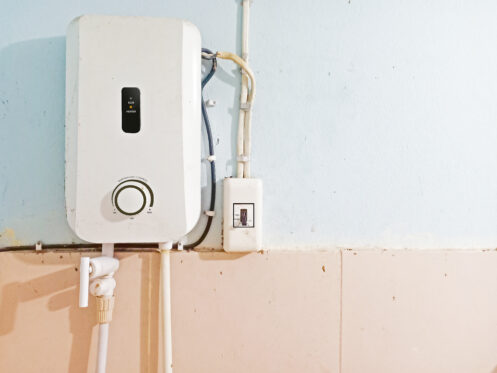In a state known for its innovation and commitment to sustainability, tankless water heaters offer many advantages that align perfectly with California’s values and environmental goals. Join us as we delve into the numerous benefits of tankless water heaters in California, shedding light on how they contribute to a more eco-conscious and convenient lifestyle for residents and businesses.
1. Energy Efficiency
Traditional water heaters continuously maintain large water tanks at a set temperature, regardless of whether you use hot water. This constant heating of water, even during periods of low use or no demand, results in what’s known as standby heat loss. On the other hand, tankless water heaters heat water only when you turn on a hot water tap or appliance. This on-demand heating prevents standby heat loss, making tankless systems significantly more energy-efficient.
Tankless water heaters are also equipped with advanced features like modulation, which allows them to adjust the heating output based on the demand for hot water. This ensures the heater is not overworking or consuming more energy than necessary. Additionally, tankless models that meet Energy Star standards are certified among the most energy-efficient heaters available, providing consumers with a reliable benchmark for choosing efficient appliances.
2. Endless Hot Water
Traditional water heaters have a finite capacity, meaning that once the stored hot water is used up, you must wait for the tank to refill and reheat. This can be frustrating, especially during peak demand periods. In contrast, tankless water heaters warm water as you need it. This means you can enjoy a continuous and uninterrupted hot water supply, even during high-demand situations.
Tankless water heaters also excel in scenarios where you require a high flow of hot water from multiple sources, such as running the dishwasher, doing laundry, and taking a shower simultaneously. The ability to meet these concurrent demands without any drop in water temperature is a major advantage.
Additionally, most modern tankless water heaters come equipped with adaptive flow control technology. This feature automatically adjusts the heating output to match the hot water demand. For instance, by using a single low-flow faucet, the heater is able to deliver hot water at the desired temperature. If additional hot water outlets are opened simultaneously, the heater will maintain the temperature while adjusting the flow rate accordingly. This ensures a consistent flow of hot water without sudden temperature fluctuations.
3. Space Savings
Tankless water heaters are substantially smaller than traditional tank-based models. Their compact design facilitates easy installation in tight spaces like closets, utility rooms, and walls. This feature is highly valuable for homeowners and businesses looking to maximize their usable square footage, especially in buildings where space can be limited.
Moreover, replacing a bulky tank-based water heater with a tankless unit frees up valuable floor space that can be repurposed for other uses. This means potential for additional storage space, creating a laundry area, or expanding the bathroom. Additionally, space savings can lead to more efficient office or storage space in commercial settings.
Tankless units are also typically easier to access for maintenance and service due to their convenient placement and lack of a massive tank. This makes routine maintenance tasks like descaling or flushing more straightforward and less time consuming.
4. Reduced Environmental Impact
Tankless water heaters consume less natural gas or electricity than traditional tank-based systems. The reduced energy consumption leads to fewer carbon emissions, making tankless units a greener choice for water heating.
Tankless water heaters also encourage water conservation practices. Since they deliver hot water instantly, there’s no need to let the tap run while waiting for the water to heat up. This minimizes water waste, an essential consideration in California’s arid regions where water scarcity is a concern.
Furthermore, since they have large tanks and complex components, traditional water heaters require more materials in their constructions. However, tankless units are smaller and simpler in design, so they consume fewer resources during manufacturing. This is consistent with California’s focus on resource conservation.
5. Longer Lifespan
Tankless models heat water as it flows through a heat exchanger. This translates to less wear and tear since there’s no need to maintain a large volume of hot water, resulting in fewer maintenance issues and a longer operational life.
6. Improved Water Quality
Traditional water heaters often use anode rods to reduce corrosion within the tank. While these rods serve a crucial purpose, they can introduce trace metals into the water supply. Tankless units do not require anode rods, minimizing the risk of metal contamination.
Tankless water heaters can also be easily integrated with water filtration or purification systems. Adding a water filtration system to your tankless unit helps enhance water quality by removing impurities and contaminants like chlorine, sediment, and heavy metals.
In addition, tankless water heaters are equipped with safety features like freeze protection and high-temperature limit switches. These features protect the unit and ensure the water is safe for use.
7. Potential Rebates and Incentives
One of the primary benefits of rebates and incentives is the immediate financial assistance they provide. These programs aim to offset the initial cost of purchasing and installing a tankless water heater, which helps make the transition to a tankless system more affordable for homeowners and businesses.
Some federal and state tax credits are also available for energy-efficient home improvements, including tankless water heaters. These credits can reduce your income tax liability, providing additional financial relief. Tax credits are often based on a percentage of the tankless unit’s total cost.
However, it is worth noting that you need to follow specific application procedures to qualify for rebates and incentives. This may involve providing proof of purchase, installation documentation, and compliance with program requirements. Also, be sure to carefully review the eligibility criteria and application process for the incentive program you plan to apply for.
8. Enhanced Property Value
Prospective home buyers are increasingly attracted to energy-efficient features like tankless water heaters since they help reduce utility bills. These systems also help make your property more appealing to eco-conscious buyers, as they reflect a commitment to environmental sustainability.
Additionally, tankless water heaters typically have a longer lifespan than traditional tank-based systems. This means buyers won’t have to budget for a water heater replacement soon, providing them with peace of mind and potentially increasing their willingness to purchase your property.
It is also worth noting that some regions of California feature specific building codes and regulations that encourage or require the installation of tankless water heaters, particularly in seismic zones. Compliance with these codes can increase your property’s marketability and perceived safety.
Count on the Best
At Environmental Heating & Air Solutions, we are familiar with California’s local climate and specific HVAC needs. We also offer emergency HVAC services and are available 24/7 to address urgent heating or cooling issues. We can also help you with air quality and plumbing concerns. Effective communication is essential when it comes to HVAC projects. That is why we explain problems and solutions clearly to clients, ensuring they understand the services we provide and any recommendations we make.
Take advantage of the opportunity to upgrade your hot water system! Contact Environmental Heating & Air Solutions for the best heating and cooling services in Roseville.

